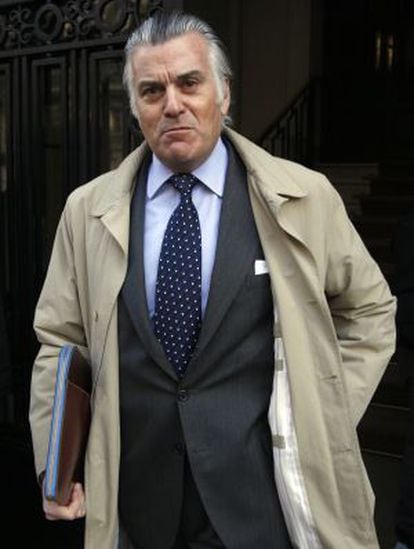Most donations recorded on PP slush fund ledgers are illegal
Over two-thirds of funds received from business and private patrons were outside of the law


A significant portion of the donations recorded in the handwritten ledgers secretly maintained by Luis Bárcenas, the former treasurer for the ruling Popular Party (PP), violated party financing legislation.
Over two-thirds of the alleged donations in these parallel accounts, which EL PAÍS brought to light on Thursday, could never have been made through official channels, either because they went over the 60,000-euro limit or because they were made by individuals or businesses that were barred from being donors.
On the expense side, the ledgers show regular payouts to members of the PP executive, who allegedly accepted this undeclared money on top of their official salaries.
The evidence suggests illegal party funding, although the PP is denying it.
The party finance legislation in force between 1987 and July 2007 said that “parties may not receive, either directly or indirectly, contributions from the same person or legal entity above the amount of 10,000,000 pesetas [60,101 euros] a year. Also forbidden are contributions from companies with current contracts to provide services or perform work or be a supplier to any public agency.”
But the notes found on Bárcenas’ secret accounts show systematic violations of this norm. There are single contributions of up to 250,000 euros, and in one case the same individual donated 400,000 in one year. The legal limit was surpassed on more than 30 occasions (the limit was raised to 100,000 euros in mid-2007).
Contributions from companies with contracts to provide services to any public agency were illegal
Most of the donors who show up on the books are individual tycoons and companies from the construction sector, as well as regular recipients of government contracts. EL PAÍS got in touch with some of these donors, who all denied any involvement. In some cases, the identity of the people on Bárcenas’ list is clear; in others, there is only a first name or a surname.
Juan Miguel Villar Mir, chairman of OHL, and Luis del Rivero, former chairman of Sacyr Vallehermoso, are perhaps the best-known construction magnates on the list. Both categorically denied having donated 530,000 euros and 480,000 euros, as shown on the handwritten ledgers.
Yet even they are not the most generous donors on the list. The top position goes to José Luis Sánchez (who is sometimes listed with his full name and others simply as J. L. Sánchez or José Luis). Over the course of five years, this person gave the party 1.15 million euros. So who is he? The individual in question could be the Málaga developer José Luis Sánchez Domínguez, founder and president of the Sando Group.
The second most generous donor is Manuel Contreras (sometimes listed as M. Contreras), with close to a million euros. Contreras is head of AZVI, a family-run construction group from Andalusia.
There are also several gifts by people who are involved in the Gürtel kickbacks-for-contracts scheme, including Pablo Crespo, Juan Cotino (head of Sedesa) and Alfonso García Pozuelo (Construcciones Hispánica). Bárcenas himself had to resign in 2009 due to his links to the corruption case.
Other donors are harder to identify, such as “López H.” who gave 15 million pesetas (90,150 euros) in 1997. The following year, there was another four-million-peseta donation by one “López Hierro.” EL PAÍS got in touch with the husband of PP secretary general Dolores de Cospedal, whose name is Ignacio López del Hierro and who has sat on the board of real estate firms like Bami or Metrovacesa.
At the height of the system, Bárcenas’ box had 900,000 euros in it
López del Hierro categorically denied being the person on the list, and stated that he never gave money to the PP. He also noted that back then, he was still not with Bami, and was instead an executive at ONCE, the blind persons’ association; he stressed as well that he had no links to the PP and had not yet met his future wife.
The fine for accepting donations over the legal limit or from banned sources was, until 2007, twice the amount of the donation. That earlier law also stipulated that all donations should be made into bank accounts opened specifically for that purpose. From that point of view, all of the donations on Bárcenas’ secret accounts would be illegal, as handwritten notes repeatedly specify that all donations were made in cash.
At the height of the slush-fund system, Bárcenas’ box had over 900,000 euros in it. Records show that, once the payouts to PP leaders and other expenses had been met, any remaining money was transferred into an account for donations that the PP kept at Banco de Vitoria (later bought out by Banesto). Around 1.2 million euros were deposited in this account. The other 7.5 million euros were used to pay PP leaders and cover various operational costs.











































